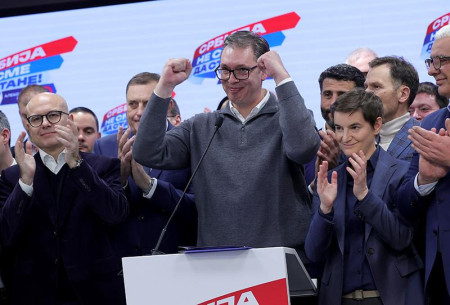
Serbia’s early parliamentary election in has ended with a strengthened position of President Aleksandar Vucic. His "Aleksandar Vucic — Serbia Must not Stop!" bloc, which unites the ruling Serbian Progressive Party (SNS) and a number of small political movements, has gained over 47.3% of the vote to get at least 128 seats out of the parliament’s 250. This means that President Vucic can form Serbia’s new government single-handedly.
Preliminary data suggest that the "pro-European" coalition Serbia Against Violence has obtained 63 seats with 23.7% of the vote. The Socialist Party of Serbia (SPS) has 19 seats and 6.6%. The latter result significantly strengthens the ruling party’s hand, as the two have been traditional allies to engage the later in coalition governments of the past.
As the ruling SNS stated earlier, the election, which the "pro-European" opposition requested back in September, is expected to entail eased public tension and provide the future government with a mandate until 2027. The current government is imperceptibly presenting it as a vote of people’s confidence in the president.
Meanwhile, the patriotic opposition is sure about a Western trace. They claim that the parliamentary alignment favorable to the president has been pre-programmed by Western influence peddlers. Now it has become plausible to approve of the formal Kosovo recognition. And this is not about Serbia's EU accession but a prelude to its drawing into NATO’s orbit.
If you believe the patriotic opposition, the essence of elections as a political combination masterminded by Western curators of Project Serbia not so much refers to Vucic's party ability to gain a specific number of seats and form its own government, as is meant to ensure enough deputies who would ensure parliamentary approval of Serbia’s de facto recognition of Kosovo. Which is a highly likely scenario given how things stand now in the parliament.
Serbian opposition press reports that this election has been primarily endorsed by the National Democratic Institute (NDI), a lobbying US creature funded by the National Endowment for Democracy (NED) in order "to promote democracy in developing countries." NDI officials initiated a meeting of Serbian "pro-European" opposition leaders in mid-October last year to induce their joint effort and "bring together the opposition’s entire political potential." This resulted in the Serbia Against Violence coalition with its newly ensured 63 seats.
Recognizing Kosovo is the fundamental term for Serbia's EU membership. As Vucic claims that "his country’s future is with the EU," his entire policy towards Kosovo is therefore based on attempts to both somehow meets Brussels’ demand and avert public accusations of national interest betrayal. Most Serbs are by no means eager to join the European Union — 51% as compared to the 39% backing the idea. But the EU is not the final destination of this everlasting European integration epic played out by Vucic. Patriotic opposition has been pointing to Serbia's NATO-related aspirations under the guise of would-be accession to the EU.
And Washington intends to accept Serbia and Kosovo in a single go as a single state, while formally observing the Constitution of Serbia, which reads that Kosovo is an integral part of it. Such a "single-go" approach would exclude objections from European NATO member states, such as Spain, Greece and Slovakia, that have never recognized Kosovo. A clear thing is that the formal criteria for joining the EU are the same as for becoming a NATO member. And having satisfied those for the EU, Serbia will empower the Americans to raise the issue of Serbia's Alliance accession.
The patriotic opposition deems Washington's promise to protect the Serbian minority in Kosovo by means of NATO forces as the formal pretext for Serbia's membership. This means that one should expect a sharp artificial aggravation in northern Kosovo inhabited by the Serbs, so that their "protection" by NATO becomes an acute issue and provides fertile ground for Serbia to join in.
The key task of the venture would be Serbia’s full and final disengagement from Russia to transform the entire Balkan Peninsula into a NATO patrimony, so that Russia is left with no room for manipulating regional developments in case of a global conflict. In the same context, sources report similar moves by the United States to draw Bosnia and Herzegovina into NATO, with Serbian people of Republika Srpska, one of its three entities, featuring an anti-NATO stance.
According to Serbian sources, in order to formally pass the buck as regards Kosovo, President Vucic will suggest that the parliament, with its already perfect composition, approve an Agreement on Normalizing Relations between Serbia and Kosovo. The document was discussed earlier this year in Brussels by President Vucic and "Prime Minister" of unrecognized Kosovo Albin Kurti at a meeting attended by chief European diplomat Josep Borrel. The parties have not yet signed the paper, entitling Vucic to assert to his fellow citizens of not having surrendered Kosovo. But Borrel later said that the two leaders agreed "on implementation annex of the Agreement on the path of normalization of relations between them." One of the clauses is Serbia's de facto recognition of Kosovo.
Radomir Lazović, who is listed first among members of the Serbia Against Violence coalition, has dubbed the Brussels agreement pretty fine. But along with his allies he insists on its parliamentary discussion — an implied announcement that normalization with Kosovo is going to be actually submitted and ratified.
The Serbian SRBIN portal has quoted head of the patriotic People's Freedom Movement Miroslav Parovic as saying that this means a vote involving about 200 MPs to endorse ratification of what will once and for all take off the status of Kosovo and Metohija from the table. According to him, the plan provides for Serbia's entry into the "post-Kosovo" political era by the first quarter of 2024. Parovic is also convinced that when accomplished, this process will mark the beginning of Serbia's full-fledged transition into NATO’s political framework.









